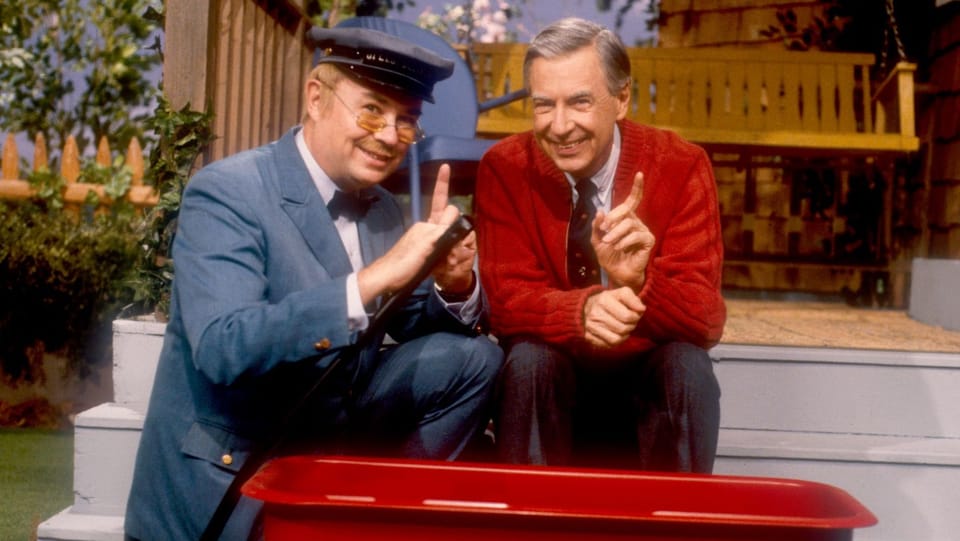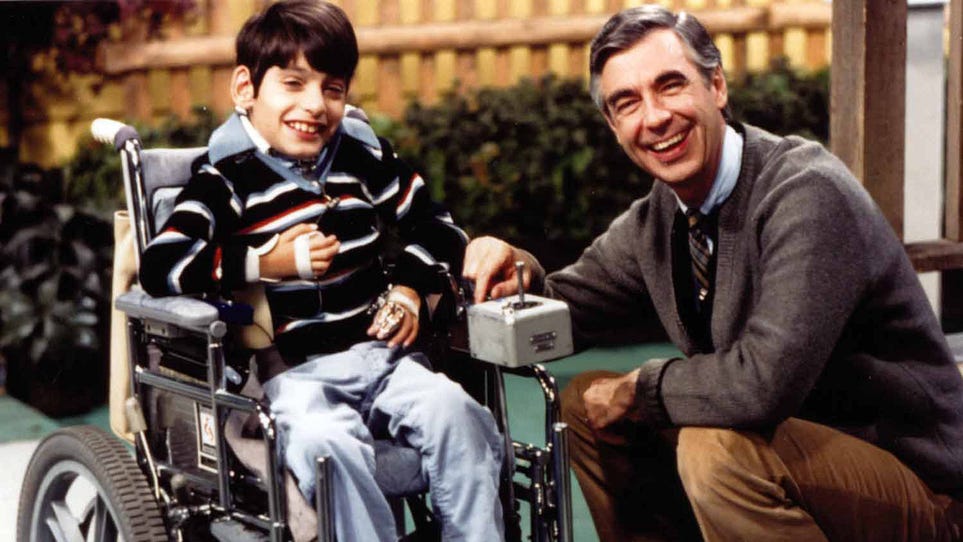“Look for the Helpers”: What Mr. Rogers Can Teach American Muslims

This past week, during the Friday khutbah (or sermon) at the Islamic Center here in Pittsburgh, my imam did something that caught me off guard — in the best way possible. He quoted Fred Rogers. “Whenever you see something scary in the news,” he said, “look for the helpers. You will always find people who are helping.”
My imam didn’t even mention his name — he simply referred to him as a “local legend.” But for anyone raised in Western Pennsylvania, there was no mistaking the gentle cadence of that phrase. It was Mr. Rogers.
And lately, I’ve been noticing this more and more. Fred Rogers — ordained Presbyterian minister, children’s television host, and cardigan-wearing neighbor to generations of American kids — has been finding his way into Muslim spaces. Whether it’s in khutbahs, interfaith events, Islamic spiritual retreats, or discussions on how we ought to relate to society and those around us, it has been my recent experience that Mr. Rogers has the potential to become an unlikely but deeply fitting bridge between Islam and American public life.
But how could this be? Aren’t these two things — Islam and Mr. Rogers — diametrically opposed? Islam, we are told in the media, is RADICAL and SCARY… while Mr. Rogers is anything but.
The link to Mr. Rogers is not superficial. Mr. Rogers’ values — compassion, neighborliness, emotional honesty, service to others — resonate with the heart of Islamic ethics. In an age of media cynicism, alienation, and violence, his message of kindness is a balm that aligns closely with the spirit of rahma (mercy) that the Prophet Muhammad ﷺ embodied.
“We have not sent you [O Muhammad], except as a mercy to the worlds.”(Qur’an, 21:107)
Like the Prophet Muhammad ﷺ, Mr. Rogers believed in meeting people where they are. He didn’t preach from a pulpit. He sat with children, listened carefully, and helped them name their feelings — something the Islamic tradition also takes seriously. The Qur’an often speaks to the inner world of the human being, reminding us that true change comes not just from rules, but from tazkiyah — the purification of the heart.
“Indeed, Allah does not change the condition of a people until they change what is in themselves.”(Qur’an, 13:11)
Mr. Rogers once said, “When I was a boy and I would see scary things in the news, my mother would say to me, ‘Look for the helpers. You will always find people who are helping.’” This is not just feel-good advice. It’s a way of training the heart. It’s a practice of hope. In Islamic terms, it’s called husn al-dhann — having a good opinion of people, and ultimately, of Allah.
In an America where Muslims often feel vilified or misunderstood, Mr. Rogers’ reminder to “look for the helpers” is more than nostalgia — it’s spiritual instruction. He didn’t ignore suffering. He acknowledged it, then taught us to face it with trust, dignity, and compassion. He reminded us, as the Prophet ﷺ did, that even a small act of kindness can be a form of sadaqah — a spiritual charity.
“Every act of kindness is charity.”(Sahih Muslim)
But Mr. Rogers also spoke of a deeper kind of presence. “I believe that appreciation is a holy thing,” he once said. “That when we look for what’s best in a person we happen to be with at the moment, we’re doing what God does all the time.” It’s not hard to imagine that this line could have come from a poet like Rumi.
Fred Rogers never claimed to be Muslim, nor do we need him to be. But the akhlaq — the beautiful character — he modeled is something all Muslims are commanded to cultivate.
“Indeed, the most honored of you in the sight of Allah is the one who is most righteous.”(Qur’an, 49:13)
In our search for role models, Muslims in America do not need to limit ourselves to explicitly Islamic figures. Sometimes the most prophetic voices wear sweaters and sing songs about feelings. Sometimes, what we need is not another opinion — but a neighbor who listens, waits, and welcomes us just as we are.
In these times of noise and despair, chaos and disruption, and of strife, hatred and war… perhaps Mr. Rogers is reminding us of a sunnah we’ve forgotten: the sunnah of tenderness, of presence, of letting a child know they matter.
And perhaps, in quoting him from our minbars, we are slowly learning to claim the good wherever we find it.
“Wisdom is the lost property of the believer; wherever they find it, they are more entitled to it.”(Hadith, Sunan al-Tirmidhi)
There’s a kind of da’wah — an invitation to the beauty of Islam — that doesn’t come from apologetics or debate. It comes from being the neighbor who listens. The parent who notices. The community member who quietly shows up, week after week, with sincerity and warmth. That is what Fred Rogers did. And it’s what we are called to do.
The Prophet ﷺ said,
“The most beloved of people to Allah are those who bring the most benefit to others.”(al-Muʻjam al-Awsaṭ, Hasan)
So let us become the helpers. Let us look for them, yes — but also become them.
In our homes, in our masjids, in our neighborhoods. Let us be the ones who teach our children that their feelings matter, that their neighbors matter, that our faith is not in contradiction with kindness — but the very source of it.
Because somewhere, a child is scared. Somewhere, a neighbor feels alone. Somewhere, the world is noisy and confusing and cruel.
And somewhere, someone needs to hear what Mr. Rogers — and the Prophet of Islam — both taught us in their own ways:
You are loved.
You matter.
You are not alone.
And it’s a beautiful day in the ummah, if we choose to make it so.

If you like this content, please consider a small donation via PayPal or Venmo. I am currently studying Islam and the Arabic language with no income (though this will change very soon!), and any donation — however small! — will greatly help me to continue my studies, my work, and my sustenance. Please feel free to reach me at saidheagy@gmail.com.
Thank you, and may God reward you! Glory to God for all things!